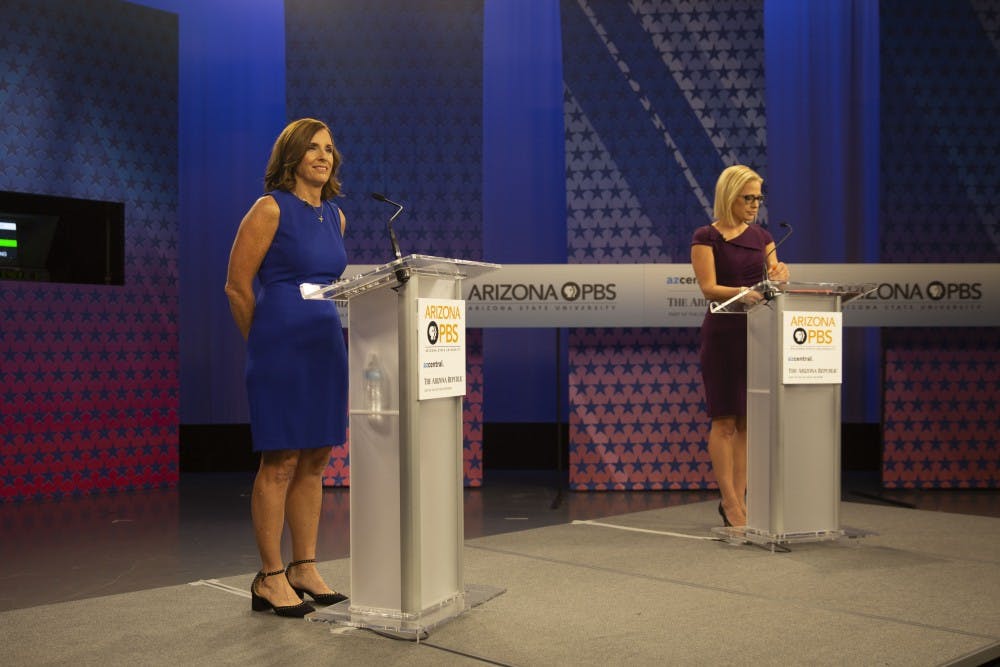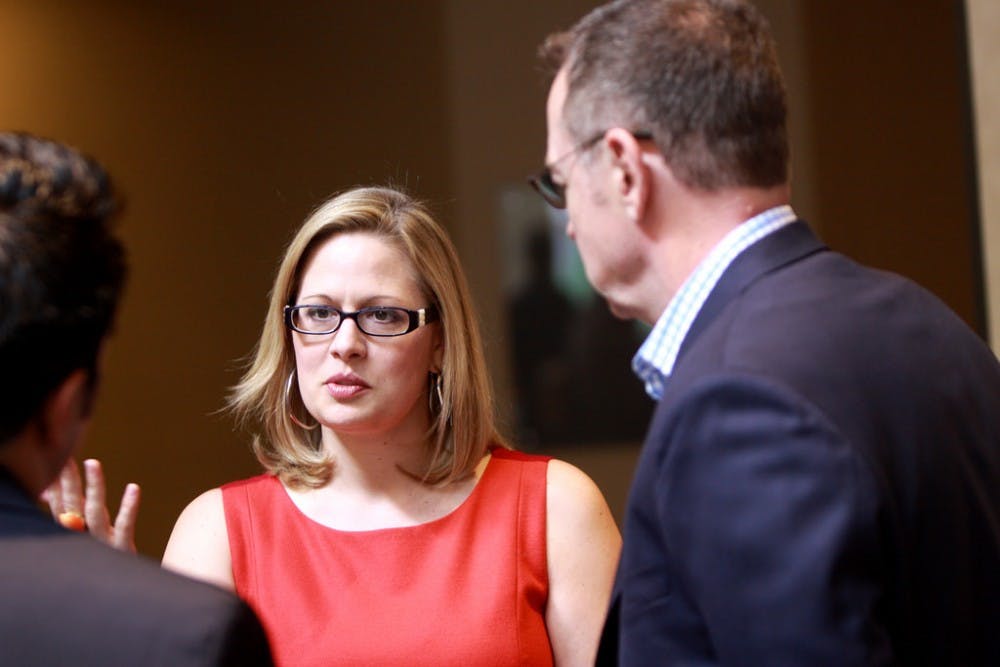Election season is upon us. If you are unfamiliar with the state of the Senate election, Jeff Flake decided not to seek re-election as Arizona's senator. This paved the way for a race between two non-incumbent candidates.
After a smooth Democratic and rough Republican primary, the candidates who emerged were Democrat representative Kyrsten Sinema and Republican representative Martha McSally.
The candidates have some commonalities on the surface: assuming either wins, Arizona will have its first female senator — a historic moment in the 106 years Arizona has been a state.
They both are current U.S. Representatives for Arizona, with McSally winning her current seat in 2015 and Sinema in 2013. Additionally, both are triathletes and believe they deserve your vote.
Sinema currently represents the district ASU is located in – Congressional District 9 – and is an ASU alumna and lecturer at the School of Social Work. McSally represents a portion of Tucson, CD 2, and is an alumna of the United States Air Force Academy and Harvard University. While she represents about two-thirds of Tucson, she does not represent the district University of Arizona is located in, CD 3, which is currently represented by Democrat Raul Grijalva.
They both support the majority of President Trump’s policies: McSally received a Trump score (how often a representative votes in line with Trump’s position) of 97.8 percent according to FiveThirtyEight while Sinema, the Democrat, received a Trump score of 62.2 percent, which is double her predicted score of 34.9 percent.
This means Sinema votes with Trump twice as often as FiveThirtyEight predicted she would.
During Trump's rally in Mesa, he called Sinema "a very, very strange opponent," and after the rally criticized the Democrats over immigration in a Tweet.
McSally and Sinema also agree on many votes, not only since President Trump has been in office, but also since former President Barack Obama's administration.
According to ProPublica's voting record comparison, “It is unusual for two members of different parties to agree on so many votes.”
Between the two congressional sessions they have served together, they voted in-line with each other 50 percent of the time.
Sinema has moved significantly toward the center in the past year. Despite disagreeing with McSally on many votes in years prior, the two representatives have agreed on every vote since July 18, 2018, according to ProPublica.
Sinema considers herself pragmatic and independent, “just like Arizona,” according to a campaign advertisement.
McSally is a member of the Republican Main Street Partnership, a group that focuses on presenting “centrist policies.” She is also part of the Tuesday Group Congressional caucus of moderate Republicans.
She did not endorse President Trump in the 2016 election, earning her the ire of many GOP voters who still regard her a reformed Never-Trumper, and has, in the past, supported legislative action to help Deferred Action for Childhood Arrivals.
On the other hand, Sinema was once a Green Party-affiliated candidate and anti-war activist who moved toward the center as she progressed in her political career.
Both McSally and Sinema have reason to shift to the right, though. They are both trying to court voters in a red state. McSally had to fight off two other prominent Republicans who were both hard-line conservatives.
Sinema has to convince conservative-leaning independents that she is not beholden to her party and will vote however she feels is best for Arizonans.
This senate race is being watched by the country because of its potential to flip a senate seat from red to blue in a historically red state. Whether browsing the internet, watching television or listening to the radio, you have no doubt seen or heard a political advertisement that is about McSally or Sinema, positive and negative.
The advertisement campaign for McSally is meant to, as she said in a recent interview with KTAR, “make sure voters look at where we have put the energy and passion into our lives.”
Sinema has stated that her campaign is staying above attacking McSally, saying, “unfortunately my colleague, my opponent, has chosen to run a campaign that is just based on attacks, and that’s not what Arizonans are looking for.”
However, there are attack ads directed at McSally, some of which have been funded by the Democratic Senatorial Campaign Committee, or DSCC, which works to “elect a Democratic Senate for the next Democratic president,” according to its website.
As far as this election goes, college students are probably more concerned about student loan debt and employment than ever before. About 45 million people borrow student loans today, while nearly 60 percent of college grads have debt from such loans, according to Student Debt Relief.
There was no discussion about education during the Oct. 15 Senate debate between McSally and Sinema. Rather, they covered topics such as their stances on illegal immigration, health care and President Trump's beliefs and behaviors.
The candidates also touched on each other's personal characters, sometimes with an accusatory tone.
When asked about her stance on education by The State Press, Sinema began by recalling that student loan debt is the top priority for her students at the School of Social Work. She also mentioned that she had loan debt from her time at the University.
This understanding has motivated her to help students while in Congress, stating that “one of the first bills I introduced when I got to Congress was a bill that said, 'Whatever your student loan rate is the day you step into college, it’s locked in for four years, so that you know what your student loan debt will be at the end of that four-year term.'”
That bill never made it into law, but Sinema believes it proves her commitment to college students.
She also said she pushed for students and parents to have access to loan counseling, so they understand the ramifications of taking out a loan. She voted for that bill (H.R.1635), which subsequently went into law, and so did McSally.
McSally’s campaign did not respond to requests for an interview.
The race did consist of a third Senate candidate: Angela Green of the Green Party. This was her first political campaign after many years in the private sector. As a graduate of the University of Utah who left with student loan debt, she believed she was the right candidate for young people.
“I encourage education, and there should not be the burden of having to pay for education and improvement,” she said.
But before the die was cast, Green dropped out of the race and gave her endorsement to Sinema.
It is often believed that no matter what a political candidate advocates, they can only be judged by how they vote, however, this proves difficult to do in this race. McSally and Sinema vote in-line with one another half of the time and in-line with President Trump a majority of the time.
The midterm election takes place on Thursday, Nov. 6, 2018. There will be a voting location on the ASU Tempe campus located in Palo Verde West Room 151.
Reach the reporter at Ryan.wadding@asu.edu or follow @ryanwadding on Twitter.
Like The State Press Magazine on Facebook and follow @statepressmag on Twitter.






